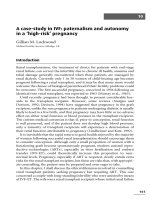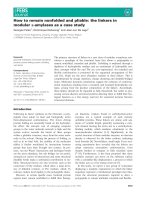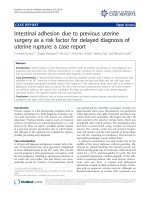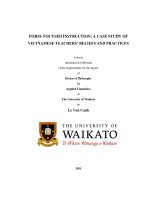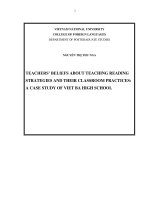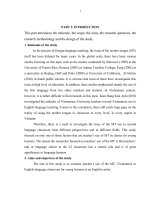Work environment as a motivating factor for self improvement of english A case study of projects in cảe internatinal in viet Nam
Bạn đang xem bản rút gọn của tài liệu. Xem và tải ngay bản đầy đủ của tài liệu tại đây (374.68 KB, 11 trang )
Work environment as a motivating factor for
self _ improvement of english: a cáe study of
projects in cảe internatinal in viet Nam
Vũ mai Giang
Trường Đại học Ngoại ngữ
Luận văn ThS. Chuyên ngành: English Teaching Methodology; Code: 60 14 10
Người hướng dẫn: Dr. Tô Thị Thu Hương
Năm bảo vệ: 2009
Abstract: In the context of globalisation and education change, learning is no longer the
tasks and responsibilities of educational institutes. Motivation to learn at workplace and
learning at workplace has become topics of interest. This thesis attempts to investigate the
motivation to self-improve English language skills at workplace, the role of work
environment as a social setting to English self-improvement as well as its elements
influencing the staff’s motivation to self-improve English, applied to a specific case of CARE
International in Vietnam – an international non-governmental organisation. CARE
Vietnamese staff were invited to answer the survey questionnaire and participate in the indepth interviews. The research reveals that most CARE Vietnamese staff possess integrative
and intrinsic motivation rather than instrumental one. Also a large number of participants
combine two or more types of motivation. In addition, the work environment has been found
out to have great impact on CARE staff’s motivation to self-improve English, varying from
position to position. The requirements of work and the relationships in the organisation are
the two most important elements influencing its staff’s motivation to learn English. Based on
the findings and discussion, the study also provides some suggestions and recommendations
for capacity building generally and English self-improvement particularly at individual and
organisational levels
Keywords: Tiếng Anh; Dự án; Phương pháp giảng dạy; Tổ chức phi chính phủ
Content:
iii
TABLE OF CONTENTS
CHAPTER 1: INTRODUCTION
1
1.1 Rationale of the study
1
1.2 Scope and purposes of the study
2
1.3 Research Questions
2
1.4 Significance of the study
3
1.5 Methodology
3
1.6 Study design
3
1.7 Definition of terms
4
CHAPTER 2: LITERATURE REVIEW
5
2.1 Motivation Theories
5
2.1.1 What is motivation?
5
2.1.2 Different approaches towards motivation in language learning
7
2.1.3 Different approaches towards motivation at work
9
2.1.4 Role of motivation
13
2.1.5 Types of motivation
15
2.1.6 Factors affecting motivation in L2 learning
18
2.2 Work environment in language learning
20
2.2.1 Language learning environment
20
2.2.2 What is meant by work environment?
22
2.2.3. Role of work environment to learning
23
2.2.4. Factors affecting learning at workplace
24
CHAPTER 3: METHODOLOGY
26
3.1 Context of the study
26
3.1.1 An overview of CARE International in Vietnam
26
3.1.2 Work Environment in CARE
27
3.2 Methodology
28
3.2.1 Case study
28
3.2.2 Validity and reliability
30
3.3 Data collection
31
iv
3.3.1 Questionnaire
31
3.3.2 Semi-structured interviews
32
CHAPTER 4: DATA ANALYSIS AND FINDINGS
34
4.1 Participants’ general information
34
4.2 Types of motivation for English self-improvement possessed by CARE
37
Vietnamese staff
4.3. Motivating role of work environment in CARE Vietnamese staff’s self-
40
improvement of English
4.4 Elements of work environment affecting CARE staff‘s motivation to self-
45
improve their English
4.4.1 Work requirements
46
4.4.2 Relationships in CARE
48
4.4.3 Opportunities
50
4.4.4 Other elements
52
4.5 Discussion
54
CHAPTER 5: CONCLUSION
55
5.1 Summary of major findings
55
5.2 Recommendations
56
5.3 Future directions
58
REFERENCES
59
1
1. Rationale of the study
Since Vietnam started its “Doi moi” process, much attention has been paid to learning how
to use English for communication. It is a fact that English teaching centres have mushroomed,
learners rush out to evening English classes with a hope to gain better marks in the exams and get a
good job. Even busy adults spend their limited time on learning English to better perform tasks, to
get promoted, to find a better job in an English speaking environment or to study abroad.
Motivation to learn English, hence, becomes more important than ever because it is the key factor
affecting the success or failure in the language learning process.
Also since Vietnam opened its door to the outside world, more and more non-governmental
organisations (NGOs) establish their representative offices in Vietnam and thousands of projects
have been implemented for Vietnam‟s sustainable development. More and more Vietnamese come
to work for an NGO and often enjoy the work environment there. NGO environment is usually a
multi-cultural, multi-lingual one where English is mainly used for communication. One question is
raised: Can Vietnamese staff improve their English in such an environment and if so, how to
improve?
Many studies have been conducted on English learning and teaching and many techniques
have been suggested for brushing up one‟s English. Though there are some studies focusing on the
motivation to study English and how to maintain and strengthen such motivation at school and
colleges, there are few or no studies on learning English and motivation to learn English after
leaving colleges.
It is quite common that some English major graduates often complain that their English
skills get worse after graduation because they do not have the environment to use it, their work
does not require them to use English and they also do not have time for further learning. Some nonmajor graduates state that they want and they need to improve their English but they do not have an
appropriate environment to learn and to use the language. In all these circumstances, the work
environment plays a crucial role in determining whether employees have strong and long-lasting
motivation to self-improve their English.
With the above mentioned reasons, the researcher would like to investigate English
learning in an NGO environment and the role of work environment in motivating staff to improve
2
their English. It is hoped that the research would be of great help for those working in an NGO in
particular and elsewhere in general.
2. Research Questions
The study was conducted on the Vietnamese staff who are currently working for different
projects in CARE International in Vietnam (hereafter abbreviated as CARE). It mainly aims to get
the answers to three research questions as follows:
1) What are the types of motivation for self-improvement of English possessed by CARE
Vietnamese staff?
2) How motivating do CARE staff find the work environment for their self-improvement of
English?
3) What elements in the work environment mainly motivate them to self-improve their
English?
3. Significance of the study
Much research has shown the importance of social contexts or learning environments on
second language learning. This study was carried out with the hope to provide language learners,
especially those who work for an NGO with an overview of the role of work environment and its
elements affecting their motivation to self-improve their English. It is hoped that, the findings from
this study will make managers better understand their staff and hence, create more favourable
opportunities for their staff learning in general and for their English learning in particular.
This study will not only help those working in CARE to reflect on their self-improvement
of English but also help English learners to be aware of and make best use of their work
environment in their path to English perfection. In the broader term, the study also might be useful
for the organisations to make the strategic plan for human resource development and give an
insight to informal learning at workplace.
3
4. Methodology
In order to achieve the primary purposes of the study, the case study was adopted in this
study. There are two reasons for this. Firstly, this is because the study involves a specific case of
projects in CARE International in Vietnam. Another reason is that the author has been a part of the
“natural setting”. She has been working in CARE International in Vietnam for one year and a half.
This case study uses both qualitative and quantitative approach with questionnaire and
semi-structured interviews as the main data collection tools for the given purpose to get an insight
into CARE‟s staff motivation to self-improve English at workplace.
A questionnaire of 17 questions was designed to explore CARE Vietnamese staff‟s beliefs
and viewpoints about the role of the work environment as well as its major elements affecting their
motivation to self-improve their English. The questionnaire was composed of three parts. Part I
aimed to gather the participants‟ general information as well as their work experience, their
positions in CARE and their learning English. While part II was employed to get CARE
Vietnamese staff„s thoughts and opinions about the work environment in CARE and their types of
motivation, part III focused on collecting their beliefs about elements of the work environment that
influenced their motivation for English self-improvement. The questionnaire was sent to about 60
CARE Vietnamese staff, of whom 46 responded (accounting for about 76%) in both English and
Vietnamese to increase the response rate,
The questionnaire was administered by internet due to some following reasons. The first
one was that each CARE staff had an email address through Outlook express (they received it when
joining CARE) and the researcher had the list of their email addresses and got their consent for
participation in the research. The second and more important reason was that sending the
questionnaire via email was fast, cheap and easy to reach the target groups and get feed back from
them.
Beside the survey questionnaire, semi-structured interviews were the second instrument
used to get the participants‟ opinions, beliefs and attitudes. After the questionnaires were returned,
a guideline for in-depth interviews was carefully designed, which aimed to clarify some points in
the respondents‟ feedbacks from questionnaires and to get more qualitative data. The nature of
4
qualitative questions, as pointed out by Lichtman (2006: 29), which “tend to ask why and how
rather than what and how many” was clearly expressed in these questions.
In short, the author has used several methods of data collection in the study to get both
qualitative and quantitative data. In given cases, some questionnaire respondents were further
interviewed to ensure higher level of validity and reliability of the data.
5. Findings
Regarding the types of motivation possessed by CARE staff, the research has found out
that 95.6 % CARE staff have integrative and intrinsic motivation, expressing through their utmost
desire and need to communicate with the expatriates in their projects. About 78.2% staff possess
instrumental motivation, nearly 20% lower than integrative motivation. Besides, many staff possess
a combination of at least two types of motivation as they indicate several reasons for learning
English in CARE such as to fulfil tasks, to communicate, to get promoted, to apply for a
scholarship, to feel confident, to get knowledge.
Since integrative and intrinsic motivation have been found out to sustain long-term
success, after working for CARE for a period of time, its staff‟s improvement has been shown in
the four language skills especially writing and reading skills.
What has motivated staff to have good language skills and to self-improve their English in
CARE? The key is the work environment here. All CARE Vietnamese staff affirm the important
and very important role of the work environment to their self-improvement of English though the
importance of the work environment is perceived differently by staff in different positions. The
work environment is perceived to be the most important to project managers and the least
important to project officers due to the difference of work requirements and exposure to the target
language.
Why is the work environment so important in promoting CARE staff‟s motivation to selfimprove their English? Learning environment or contexts, interaction and the work itself are the
most important elements. This is completely true applying to CARE‟s context. Firstly, English is
required when one comes to work for CARE and in their daily task, little or much, they need
English to write reports, to read materials, to use emails for work purposes, to discuss and
exchange about work, to attend workshops and meetings. Secondly, the relationships among peers
5
and between colleagues and supervisors in CARE are friendly and supportive enough so that
people can feel free to ask a difficult term in English and others are willing to explain and translate
that word if they know. Thirdly, the opportunities of getting promoted and applying for an outside
scholarship when working for CARE also motivate staff to increase their English abilities. Though
the opportunities strengthen the instrumental and extrinsic motivation, they are also very important
to adult learners.
6. Discussion
Though the work environment in CARE really support CARE‟s staff motivation to learn
English and it staff have very high and strong motivation towards self-improving their English,
when being asked about the schedule for self- learning, they seem not to have a very clear and
specific plan. Up to 52.2% are undecided about the schedule while 34.8% agreed and 4.3 strongly
agreed that they have a clear plan.
In the interviews, some gave the excuse for that as “because I have accomplished my tasks
as required”, “because now my English in use is good enough” and also because “I have small
children to take care of so I cannot arrange my time for brushing up my English.”
This is also understandable because from awareness and attitudes to behaviour change,
there is still a gap. Though their motivation to learn English is high, it does not necessarily mean
that they will learn English regularly and intentionally. Rather in the context that CARE staff have
opportunities to communicate with foreigners and expose to materials in English frequently, the
learning sometimes happens subconsciously.
7. Recommendations
From the major findings and discussion, there are several recommendations to improve
English in CARE or some implications for a similar NGO setting as follows:
Firstly, since the work requirements are the most important element for self-improving
English, one can take challenging and relevant tasks that require using English more and more.
Supervisors can help and assign specific and challenging tasks (just one level more difficult) to
motivate their staff to perfect their English.
6
Secondly, relationships or interaction are very important to learning English. One can learn
successfully and sustain motivation when there is encouragement and mutual learning from
colleagues and supervisors. Together learning, they can create a learning community with a
specific plan. For example, a team of 3 or 4 people in one project can practise listening to BBC,
reading aloud and commenting about the pronunciation for each other. Or a group of staff can share
their writing essays on specific topics for comments and revision. This will create the learning
culture within the organisation, which is very helpful to professional development and English
enhancement.
Thirdly, it is advised that more and more opportunities be generated to maintain and
promote staff‟s motivation. Better English can be an advantage for promotion or higher salary, for
getting a scholarship or win a friendly competition within the organisation. For example, in CARE
International, they have an essay writing competition among many countries in which CARE staff
can share their impression or tell a story about what the communities have grown up thanks to the
project activities.
In addition, as mentioned above, the learning culture is very important within one
organisation. Duke (2002: 107) suggested:
“It is essential for an organization to look at its own cultural setting and devise a system of
learning that best suits it”.
Though the policy in CARE is quite good already, it still needs to be reflected and improved to
strengthen the learning at workplace.
Additionally, it is suggested that each staff should take the initiative role or ownership in
their own learning. Though work environment in CARE is very good for learning in general and in
this case study very good for improving English, each and every staff should take any opportunity
to learn wherever and whenever. As this case study is an illustration, education and learning is a
life-long process and in any environment, even after graduation or not in an educational setting,
learning is always taking place and motivation for learning always live.
Last but not least, from the organisational perspective, since the work environment plays a
vital role in learning, it would be helpful if the organisations and leaders have a strategic plan for
human resource development with capacity building activities as well as create favourable
conditions and policies that support working and learning.
7
REFERENCES
1. Aldelman, C., Kemmis, S. and Jenkins, D. (1980) Rethinking case study: notes from the
second Cambridge conference. In H. Simon (ed.) Towards a Science of the Singular.
Norwich: Center for Applied Research in Education, University of East Anglia, pp.45-61.
2. Australian National Training Authority, (2003), What makes for good workplace learning,
National Centre for Vocational Education Research Ltd.
3. Baloto, F. (1996), How to motivate learners of English. FORUM, Vol.34 No 1.
4. Barnett, R. (1999) Learning to work and working to learn. In D Boud. & J. Garrick (eds)
Understanding Learning at Work, London, Routledge.
5. Bassey, M. (1999) Case Study Research in Educational Settings, Open University Press,
GB.
6. Brown, H Douglas (2007) Principles of language learning and teaching, Pearson Longman.
7. Brown, H Douglas (2001) Strategies for success: A practical guide to learn English.
Pearson Education & Longman
8. Bush T. and Middlewood David, (2005) Leading and Managing People in Education,
SAGE Publications, GB.
9. Canh, Le Van (2008), Teachers’ beliefs about Curricular Innovation in Vietnam: A
preliminary study.
10. Dornyei, Zoltan (2001) Motivational Strategies in the language classroom, Cambridge,
Cambridge University Press.
11. Dornyei, Zoltan (2001) Teaching and Researching motivation. Pearson Longman
12. Duke, C (2002) Managing the Learning University. Buckingham: Open University Press.
13. Ellis, R. (1997), “Individual differences in second language acquisition”. Second language
acquisition. Oxford, OUP.
14. Ellis, R. (1985), Understanding second language acquisition. Oxford, OUP.
15. Eraut, M. (2004) Informal learning in the workplace, Studies in Continuing Education,
Vol. 26, No. 2, Carfax Publishing House.
16. Eraut, M. (2004) Transfer of Knowledge between Education and Workplace Settings, in
H.Rainbird, A.Fuller and H.Munro (Eds) Workplace Learning in Context, pp201-221,
London, Routledge.
17. Frazer, L. and Lawley, M. (2000) Questionnaire design and administration, John Wiley
and Sons Australia, Ltd.
18. Gardner, R. C. (2001), Language Learning Motivation: The Student, the Teacher, and the
Researcher, the Texas Foreign Language Education Conference, University of Texas.
8
19. Huong, Ly Van (2004), An investigation of non-English majors’ motivation in an English
language class at Bac Ninh junior teacher training college, Unpublished MA dissertation.
20. Jack Richards, John Platt, Heidi Platt, 2nd edition, (1992), Longman dictionary of
Language Teaching and Applied Linguistics, Longman Group UK Limited.
21. Krashen, S.D. (1987). Principles and Practice in Second Language Acquisition. New York:
Prentice-Hall.
22. Kurmar, R. (1996). Research methodology, London, Longman.
23. Lightbown, P.M and Spada, N. (1999): “Factors affecting second language learning”. How
languages are learned. Oxford, OUP.
24. Littlewood, W. (1995). Foreign and Second Language Learning. Cambridge:CUP.
25. Littlewood, W.T. (1998). “Motivation for learning English”. Foreign and second language
learning. Cambridge, CUP.
26. Long, Tran (2005) Motivating learners to learn English: a study on Hanoi Industrial
College learners. Unpublished MA dissertation.
27. Maslow, A. (1954) Motivation and personality. New York, Harper.
28. Nhung, Nguyen Mai (2003), Motivation and factors affecting motivation in learning
English writing of the Freshmen at the Department of English and Anglo-American
Culture, VNU-CFL, Unpublished MA dissertation.
29. Spolsky, B. 1989. Conditions for Second language learning. Oxford, OUP.
30. Spolsky, B. 1998. Conditions for Second language learning. Introduction to a general
theory. Oxford: OUP
31. Vroom, V. (1964) Work and motivation. New York, Wiley.
32.
33. />34. />
